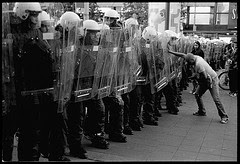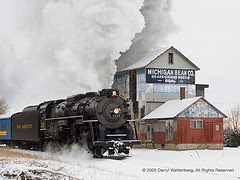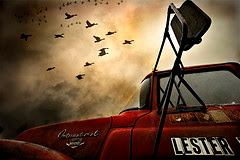Wikipedia is a double-edged sword for educators. As a world history and American history teacher I know all too well the conveniences & pitfalls of the user-friendly (albeit circuitous) buffet of information. There truly is something for everyone and anything. Many a sophomore and junior, that have graced the windowless cave called Anderson's room, have not-so-skillfully executed the "cut-and-paste" from Wikipedia strategy. My sixteen year old students are no different than anybody elses...Give them an assignment on assessing the current status of American ideals (set forth in the Declaration of Independence) and you will get an artfully crafted together work of wiki-magic. If you're not careful (or not paying attention) as a teacher, students can get away with papers that are almost purposefully a little flawed so as to get away with the Wikipedia generated paper. Even better, tell a student to read "All Quiet on the Western Front" by Erich-Maria Remarque (or heck, even watch the movie) and they go straight for old faithful, the source that never disappoints...an online Mecca of information, factoids & questionable chronology at their fingertips.
Even this past week I squirmed in my chair as I read two separate essays from two different classes that tastefully lamented the struggle of Dustbowl farmers and the boys of the Civilian Conservation Corps. Word for word, line by line, I wasn't reading a Johnny Q. Student original treatise, I was reading a printed out wikipedia article. It was right before the holiday break when students tend to slide a little and my guess is, a few key strokes and mouseclick was the solution to my assignment. I do tell my students to "when faced with an obstacle, improvise, adapt & overcome", but I think they added a corollary "when its midnite before Mr. Anderson's essay is due and I have been played C.O.D. (Call of Duty to us lame teachers) all night, visit wikipedia or facebook for the answers." It's scary how the students walking the halls of my school (not unique from those walking the halls of Cadillac or Farmington Hills) are out-pacing their teachers in knowledge, know-how and literacy of technology. And they know it too...
But, like I said, wikipedia is double-edged sword. It can and does provide a convenient, cursory look at some basic content. With the correct instruction and preparation, students can use this online source with a discerning eye and compare & contrast prior knowledge and learned content. For instance, this week in American History, my students are filling out charts on the heroic and nefarious historical characters of World War II. I do allow them to cross-reference their info on Benito Mussolini, Francisco Franco & Omar Bradley with wikipedia, primarily because they are only given two or three paragraphs (or maybe only a small blurb) in the TCI History Alive text we use. They can also use it to help them fill-out timeline sheets that I assign and develop a basic schema of cause & effect during the late 1930s and 1940s...They can read a little more about how remilitarization of the Rhineland and the invasion of the Sudetenland happen, cross reference it with other suggested & teacher-approved sites (like http://www.bbc.co.uk/history/). Sometimes my students who ate their Wheaties for breakfast can catch the inaccuracies. That then provides a teachable moment. We line up the TCI History Alive book, another credible website and then wikipedia. It is usually a two sources to one victory for the secondary source & the other valid source. I don't have to say a word. Except maybe a few minutes later I do say,"When you go to college and write a paper, make sure that wikipedia.com does not show up in your works cited."
I never see them really, but I know that comment is greeted with more than a few eye rolls. What's a lame teacher to do?
Works Cited
http://www.bbc.co.uk/history/
Tuesday, January 26, 2010
Subscribe to:
Post Comments (Atom)




2 comments:
I did not know that BBC was a good source for history. BBC is journalism, not scholarship. As a science professor, I know that journalists writing on science topics in the general press commonly make mistakes that would not be tolerated of highschool students. I would certainly not tolerate any citation of a newspaper or similar source to establish a scientific fact, even the most basic one. Is it different in history?
By the way, Wikipedia cites a number of sources, don't students ever make the effort to cross-check facts in these sources?
Brad, really good writing. Thought provoking. Credible. Real. Right out of "Made to Stick." Are you a writer?
Post a Comment